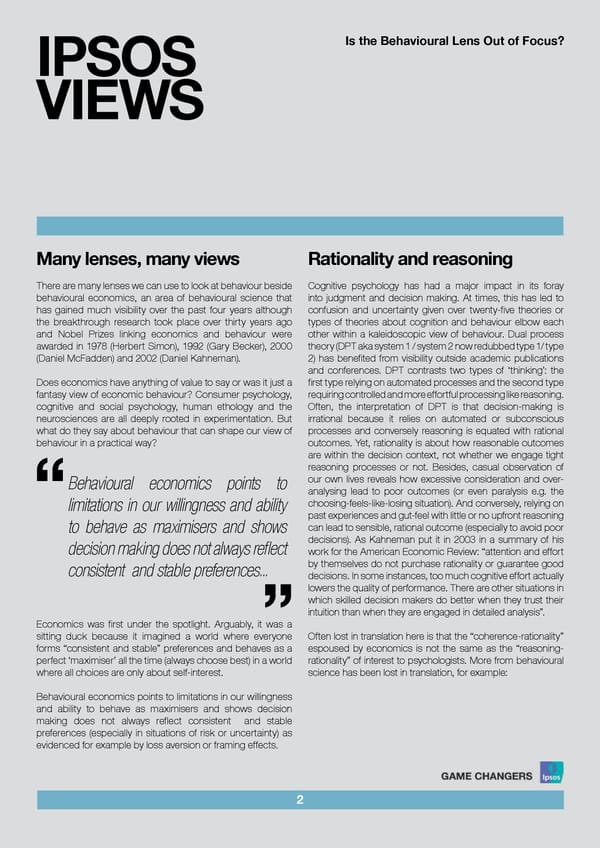IPSOS Is the Behavioural Lens Out of Focus? VIEWS Many lenses, many views Rationality and reasoning There are many lenses we can use to look at behaviour beside Cognitive psychology has had a major impact in its foray behavioural economics, an area of behavioural science that into judgment and decision making. At times, this has led to has gained much visibility over the past four years although confusion and uncertainty given over twenty-five theories or the breakthrough research took place over thirty years ago types of theories about cognition and behaviour elbow each and Nobel Prizes linking economics and behaviour were other within a kaleidoscopic view of behaviour. Dual process awarded in 1978 (Herbert Simon), 1992 (Gary Becker), 2000 theory (DPT aka system 1 / system 2 now redubbed type 1/ type (Daniel McFadden) and 2002 (Daniel Kahneman). 2) has benefited from visibility outside academic publications and conferences. DPT contrasts two types of ‘thinking’: the Does economics have anything of value to say or was it just a first type relying on automated processes and the second type fantasy view of economic behaviour? Consumer psychology, requiring controlled and more effortful processing like reasoning. cognitive and social psychology, human ethology and the Often, the interpretation of DPT is that decision-making is neurosciences are all deeply rooted in experimentation. But irrational because it relies on automated or subconscious what do they say about behaviour that can shape our view of processes and conversely reasoning is equated with rational behaviour in a practical way? outcomes. Yet, rationality is about how reasonable outcomes are within the decision context, not whether we engage tight reasoning processes or not. Besides, casual observation of Behavioural economics points to our own lives reveals how excessive consideration and over- analysing lead to poor outcomes (or even paralysis e.g. the “limitations in our willingness and ability choosing-feels-like-losing situation). And conversely, relying on past experiences and gut-feel with little or no upfront reasoning to behave as maximisers and shows can lead to sensible, rational outcome (especially to avoid poor decision making does not always reflect decisions). As Kahneman put it in 2003 in a summary of his “ work for the American Economic Review: “attention and effort consistent and stable preferences... by themselves do not purchase rationality or guarantee good decisions. In some instances, too much cognitive effort actually lowers the quality of performance. There are other situations in which skilled decision makers do better when they trust their intuition than when they are engaged in detailed analysis”. Economics was first under the spotlight. Arguably, it was a sitting duck because it imagined a world where everyone Often lost in translation here is that the “coherence-rationality” forms “consistent and stable” preferences and behaves as a espoused by economics is not the same as the “reasoning- perfect ‘maximiser’ all the time (always choose best) in a world rationality” of interest to psychologists. More from behavioural where all choices are only about self-interest. science has been lost in translation, for example: Behavioural economics points to limitations in our willingness and ability to behave as maximisers and shows decision making does not always reflect consistent and stable preferences (especially in situations of risk or uncertainty) as evidenced for example by loss aversion or framing effects. 2
 Is the Behavioural Lens Out of Focus? Page 3 Page 5
Is the Behavioural Lens Out of Focus? Page 3 Page 5